Coverage: UN Women Executive Director takes #HearMeToo to Pakistan
Date:
Authors: Montira Narkvichien, Anam Abbas and Habib Asgher
UN Women Executive Director, Phumzile Mlambo-Ngcuka, started her first official visit to Pakistan today, as part of her travels during the 16 Days of Activism Against Gender-Based Violence. The visit aims to bolster the gender equality agenda in the country.
7 December 2018
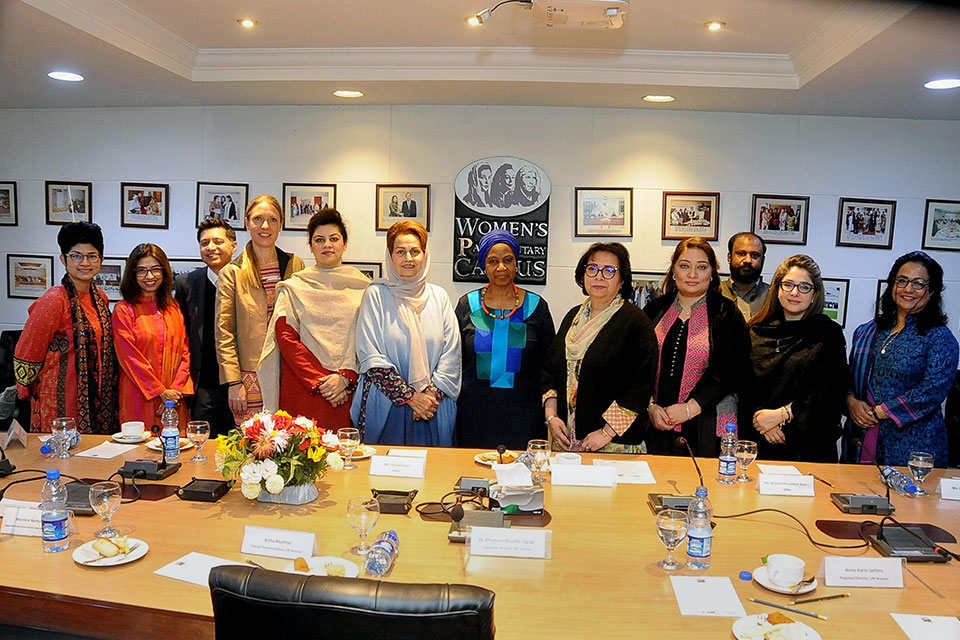
On the final day of the Executive Director’s mission in Pakistan, she met with the Women Parliamentary Caucus (WPC), where she stressed the importance of full, equal and effective participation and leadership for women at all levels of decision-making is the key to unlocking the transformative change in the societies and achieve sustainable development.
The Executive Director drew attention to UN Women’s existing tools and resources of such as iKnowPolitics, an international knowledge platform that fosters exchange, dialogue and knowledge creation for all who are engaged in promoting women’s political participation and the most recently launched flagship publication Gender Equality and the Sustainable Development Goals in Asia and the Pacific to be informed about the Sustainable Development Goals and the gender equality related indicators.
Member of National Assembly and WPC Secretary, Munaza Hassen raised some key challenges by women, among those are the low number of women Members of the Parliament and parliamentary leaders can mean that women’s voices are not heard on an equal footing with men. In Pakistan’s lower house, women represented 25.2 per cent of the total 272 members; while in the Upper House, it remains low at 18.8 per cent.
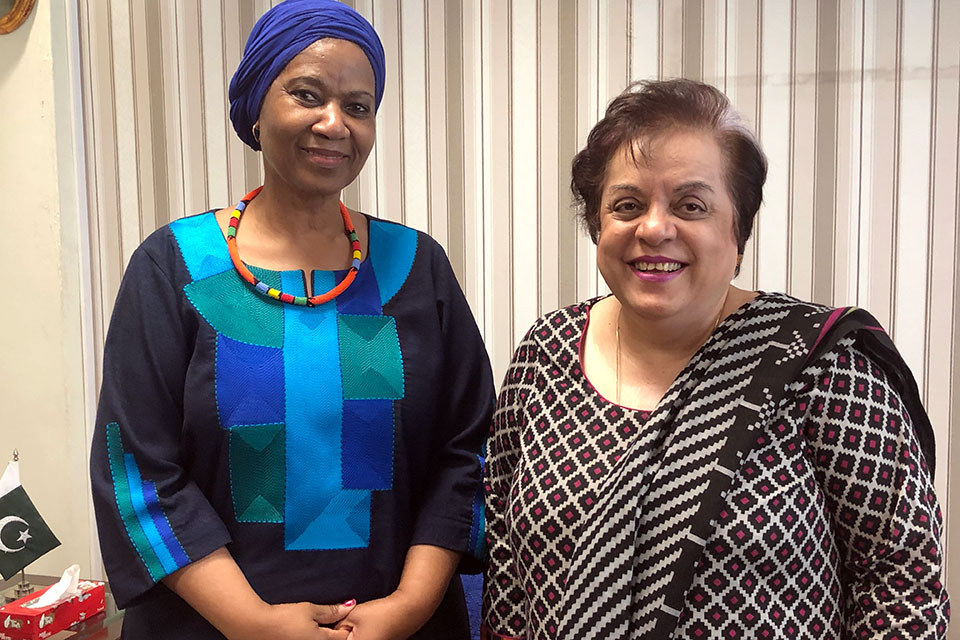
Later in a meeting with Human Rights Minister Shireen Mazari, the Executive Director encouraged effective implementations of quota system for more women’s representation in the legislation for more gender-sensitive laws.
Minister of Human Rights welcomed the Executive Director’s initiative to strengthen its closer collaboration on developing a guidebook for women survivors of violence on how they can go for protections and services where their voices will be heard.
On her third day in Pakistan, the Executive Director participated in an interactive dialogue on ending harassment of women with disabilities, joined by Minister of Human Rights, Shireen Mazari; Resident Coordinator, Neil Buhne; and Jamshed Kazi, Country Representative of UN Women.
“To create spaces for women is a shared and collective responsibility,” said Ms. Mlambo-Ngcuka. “In addition to making policies that favour women with disabilities, we also need to challenge social norms in our homes, schools, institutions, and spaces of work, to make lives more liveable for women.”
Minister for Human Rights Shireen Mazari, informed the audience that the ordinance to protect the rights of persons with disabilities was now going to be part of proper legislation after consent from Parliament, as the bill had been approved by cabinet in its recent meeting. The bill, she explained, includes clauses for the right to education, right to dignity, right to privacy and some other important points.
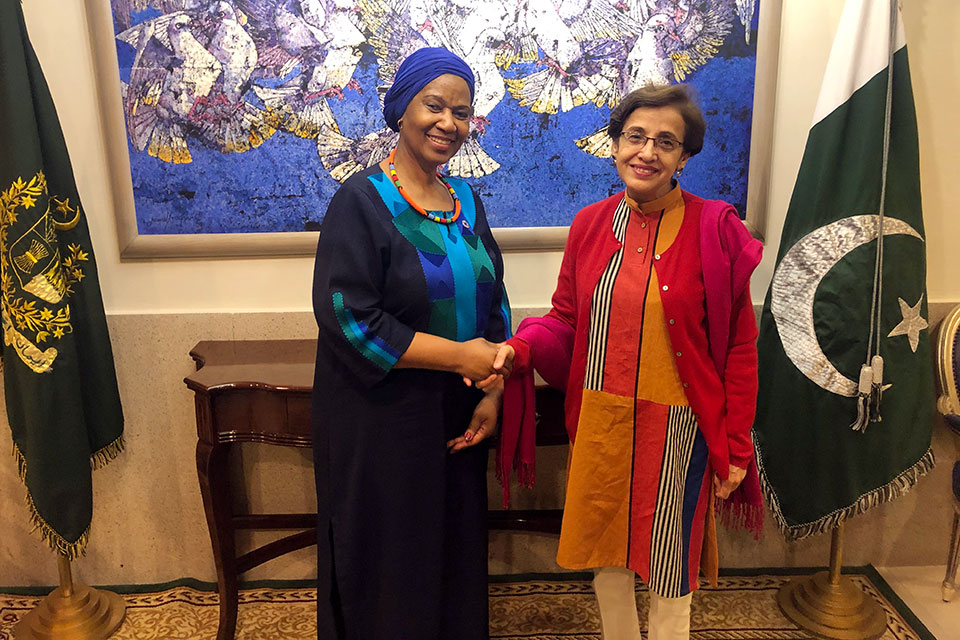
The final meeting of the Executive Director’s mission in Pakistan ended with an affirmation of commitment and support of the Honourable Secretary of Foreign Affairs, Tehmina Janjua.
The reviews should include an assessment of current challenges that affect the implementation of the Platform for Action and the achievement of gender equality and the empowerment of women and its contribution towards the full realization of the 2030 Agenda for Sustainable Development through a gender perspective. “Pakistan will collaborate and please do not hesitate to call upon Pakistan for any support,” said the Foreign Affairs Secretary.
During an interactive dialogue on ending harassment of women with disabilities, Executive Director of UN Women, Phumzile Mlambo-Ngcuka joined by Minister of Human Rights, Dr. Shireen Mazari; Resident Coordinator, Neil Buhne, and Jamshed Kazi, Country Representative of UN Women; partners and media - heard the voices and learned about the resilience of Pakistani women with disabilities, who have stood up against the challenges of harassment and violence.
“Under the 16 days of activism, it is important to highlight the issues that affect women who live with disabilities”, said Ms. Mlambo-Ngcuka. “In addition to making policies that favour women with disabilities, we also need to challenge social norms in our homes, schools, institutions, and spaces of work, to make lives more liveable for women.”
6 December 2018
The second day of Ms. Mlambo-Ngcuka’s visit to Pakistan started with a dialogue with private sector on gender equality, and a panel discussion to understand how partnership with the private sector and social partners is important to advance gender equality in organizations.
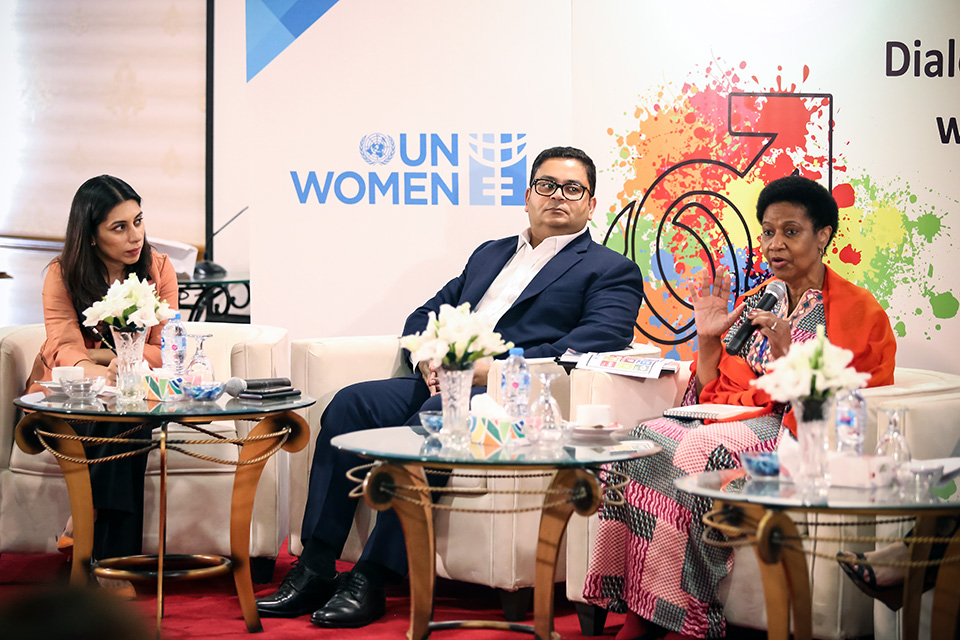
Ms. Mlambo-Ngcuka stressed upon the corporate leaders to be more proactive towards embracing gender equality in their operations. “If we talk about addressing the issue of ending violence against women, or talking about sexual harassment at workplaces, private sector needs policies to address human rights issues and economic issues,” she stressed.
UN Women has been working with the Private sector companies in Pakistan since 2015. These companies are encouraged to include and increase the number of women in their workforce at each level. Because of UN Women’s efforts, more than 1,000 women have joined the organized sector in Punjab. Fifty-six companies have signed the UN Global Compact and UN Women’s Women’s Empowerment Principles in Pakistan since its launch in April 2015.
5 December 2018, Mithi, Tharparkar
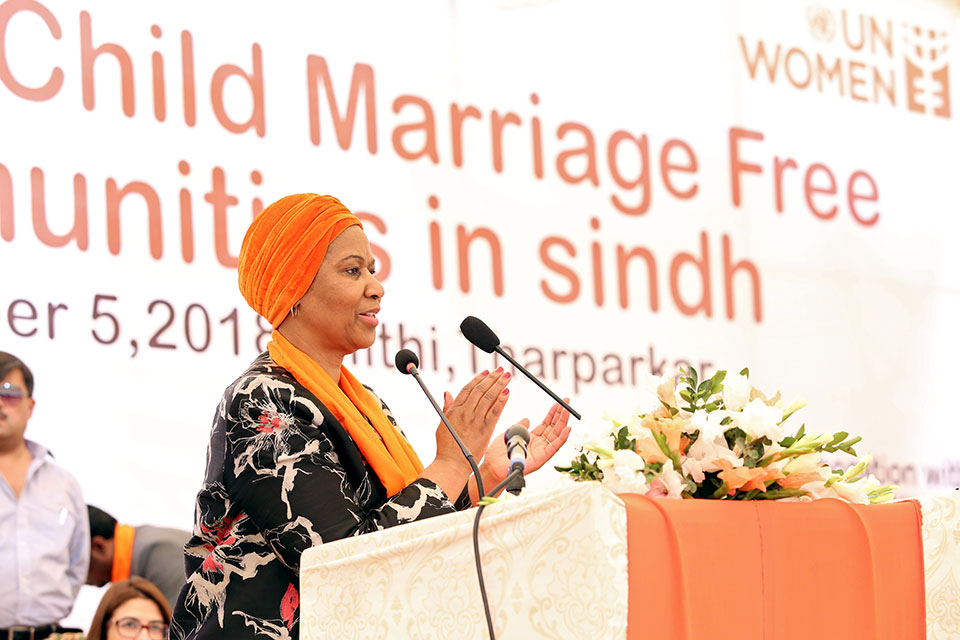
Making one of Pakistan’s most impoverished districts the first stop of her first official visit to the country, United Nations Under-Secretary-General and UN Women Executive Director Phumzile Mlambo-Ngcuka today called upon the entire community to end child marriages and voice their commitment to change the lives of girls and young women for the better.
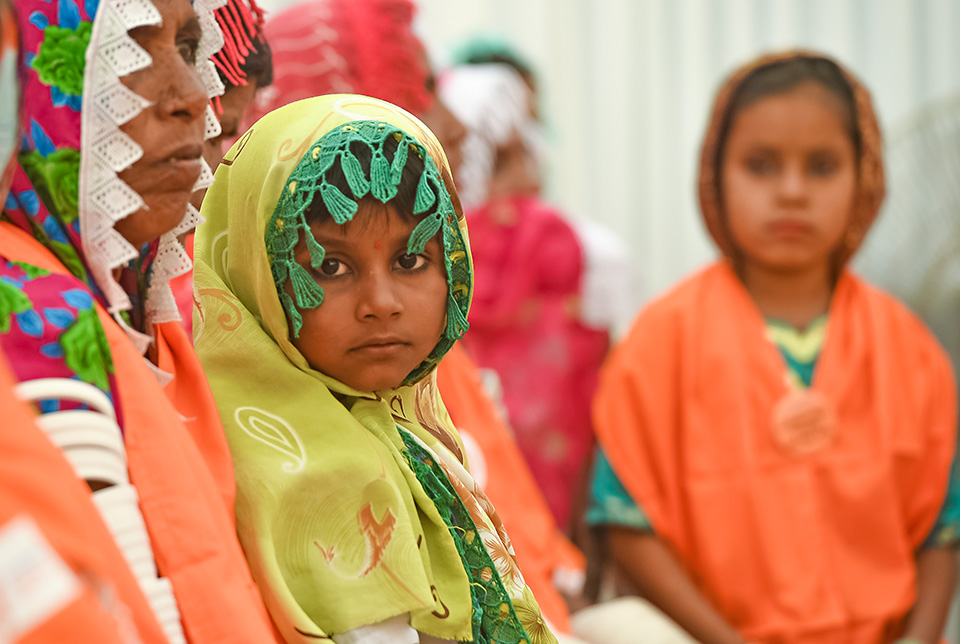
“We know today that when a girl is married, she misses out on her education; she is going to be poor. As parents, we do not want our children to be poorer than us. We want the next generation to be better and better. We have women and men in this community in Mithi who have foresight. The changing of their dreams starts here,” the Executive Director said in her dialogue with over 300 residents, notables of the area, government officials, civil society representatives and members of the local press.
They gathered at the Shaheed Benazir Bhutto Cultural Complex in the district capital, Mithi, at an event to mark the 16 Days of Activism against Gender-based Violence campaign.
“I commend the women, girls, men and boys of Mithi on coming together in solidarity with a message to end child marriages and commitment to change the lives of girls and young women. Becoming a ‘zero child marriage’ village will require the efforts of everyone,” she said.
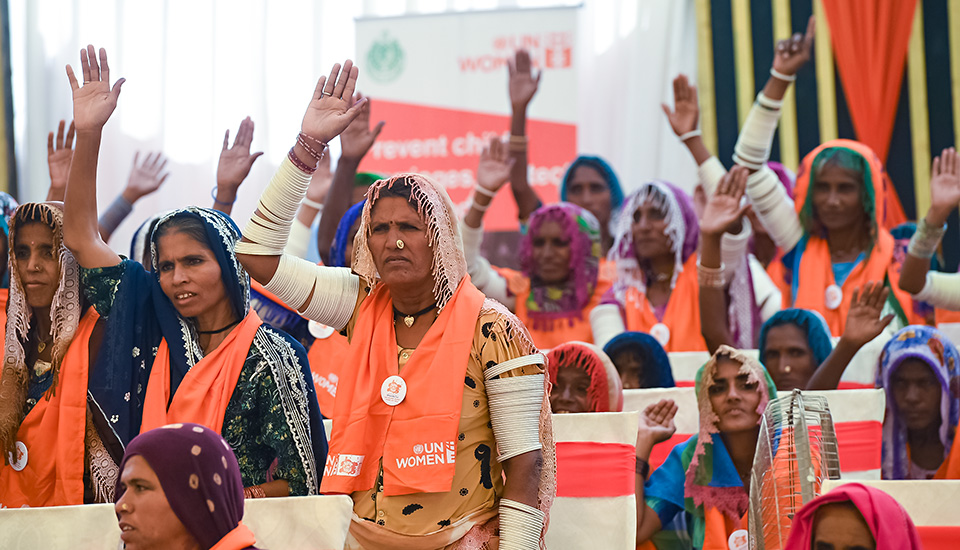
The Executive Director witnessed men in the entire community—including heads of families, notables, senators, legislators and members of the press—pledge to say ‘no’ to child marriage.
“When the whole nation commits to tackling deep-rooted traditions like child marriage head-on, millions of girls stand to benefit. This is also a task for men, who can accelerate progress by saying simply ‘I will not marry a child’,” the Executive Director said.
Calling on religious and traditional leaders to use their position of authority to take a stand against violence and protect the rights of girls, the Executive Director also received pledges from religious clerics, registrars and local politicians to make Mithi a ‘zero child marriage’ village and set an example for others to follow.
The Minister for Women Development for the Province of Sindh, Syeda Shehla Raza, said that the Government of Sindh is doing everything possible to ensure the implementation of laws related to women’s health and the social, political and economic empowerment of women. She urged communities to stand up and together pledge that none of their members will ever marry their children under 18 or facilitate any such marriage in any way. “Abb nahi! (Not now!)” the Minister led the community to recite in solidarity.
Earlier, she recounted the history of Sindh and how its women historically struggled for their rights and left their mark in history as the most empowered women in the region.
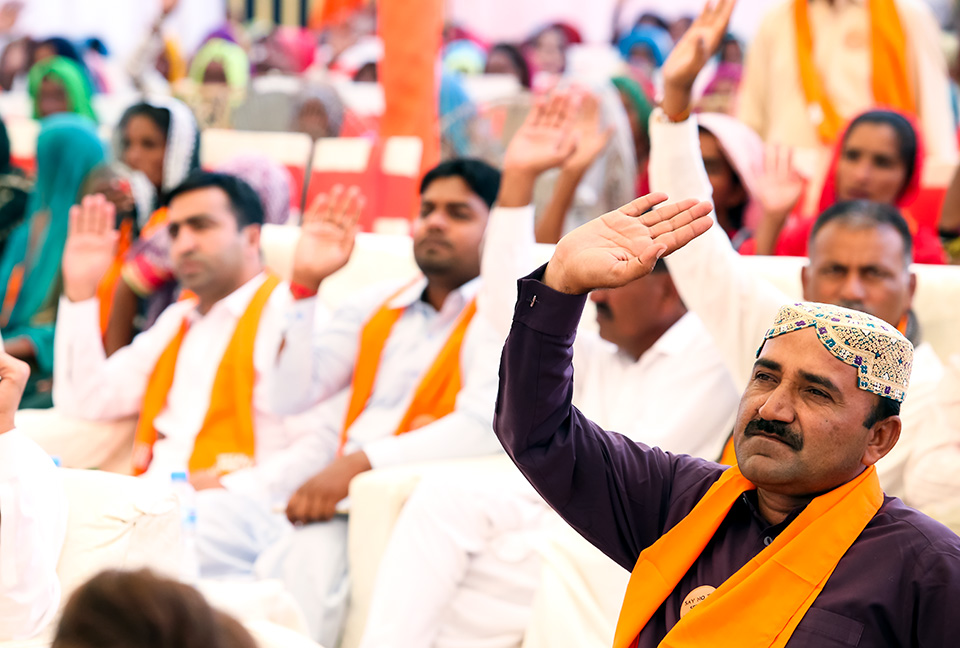
Pakistan’s Child Marriage Restraint Act 1929 sets the legal age for marriage at 16 for women and 18 for men. In April 2014, the provincial Sindh Assembly unanimously adopted the Sindh Child Marriage Restraint Act, making marriage under age 18 a punishable offence.
However, Minister Raza said more public awareness and oversight by relevant authorities are needed to ensure adherence to the law. She thanked the Executive Director for beginning her visit in Tharparkar, saying she hopes it will amplify the collective efforts to fight early child marriage, not only in Sindh but across the nation.
Child marriage is a fundamental human rights violation that constitutes a grave threat to young girls’ lives, health and future prospects. The right to ‘free and full' consent to a marriage is recognized in the Universal Declaration of Human Rights—with the recognition that consent cannot be ‘free and full’ when one of the parties involved is not sufficiently mature to make an informed decision about a life partner.
“This (child marriage) issue needs a continuous and focused effort, and we are thankful to UN Women for supporting the Sindh Commission on the Status of Women in conducting the training of marriage registrars all over Sindh, which will involve local government officers, commissioners and union councils,” said Nuzhat Shirin, Chair of the Sindh Commission on the Status of Women.
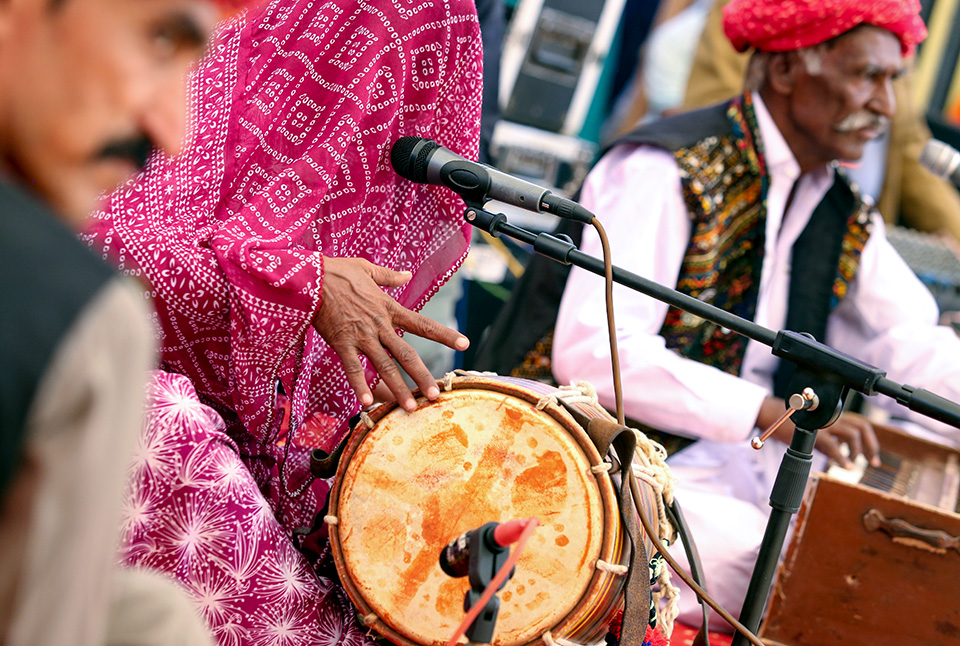
It is estimated that there are 650 million women and girls in the world today who were married before age 18. Over the past decade, the global rate of child marriage has declined—from one in four young women aged 20-24 married as children, to almost one in five.
At the national 16 Days of Activism event in this southeast district of Pakistan, the Executive Director encouraged families and the community to be more vigilant to prevent and report cases of under-aged marriage. She also urged the religious leaders who solemnize marriages to confirm whether the bride and groom are of legal age, stressing the importance of birth certificates and national identity cards for verification.
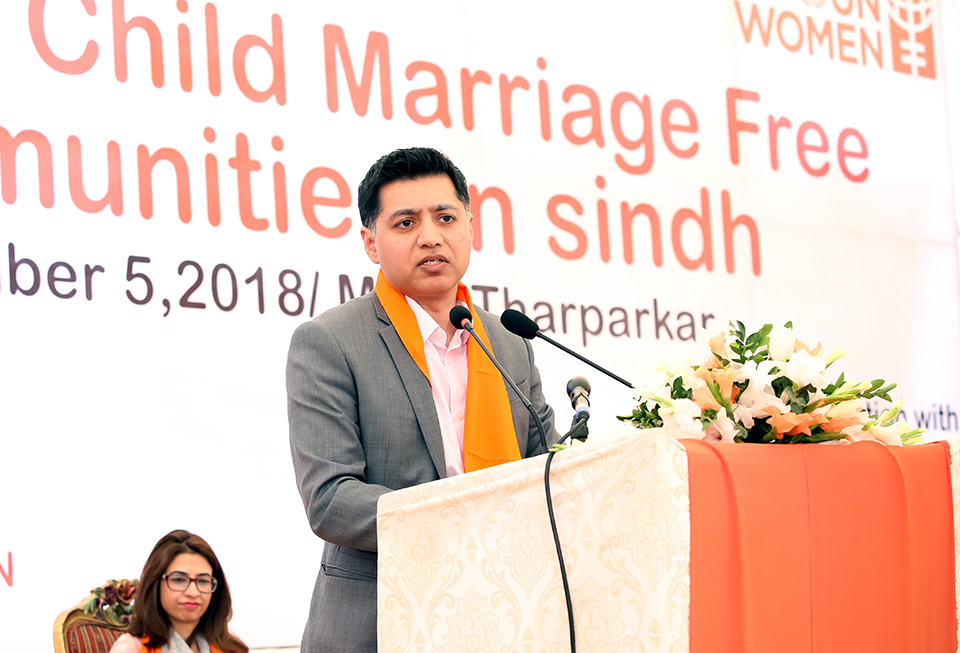
Social and gender inequality, a desire to control women’s sexuality and protect family honour, economic hardship and lack of awareness of the harmful impact of child marriage are common driving factors.
“UN Women in Pakistan is supporting community initiatives in both rural and urban areas across the country that work with girls and boys and that seek to foster youth leadership aimed at ending violence against women and girls, and that support young women and men as champions for change,” said Jamshed Kazi, UN Women Country Representative.
Youth dialogue in SZABIST University on ending sexual harassment
The next stop for the Executive Director was SZABIST University, the country’s leading technological university, for a dialogue with youth. Ms. Mlambo-Ngcuka called upon the university administration to show zero tolerance to sexual harassment.
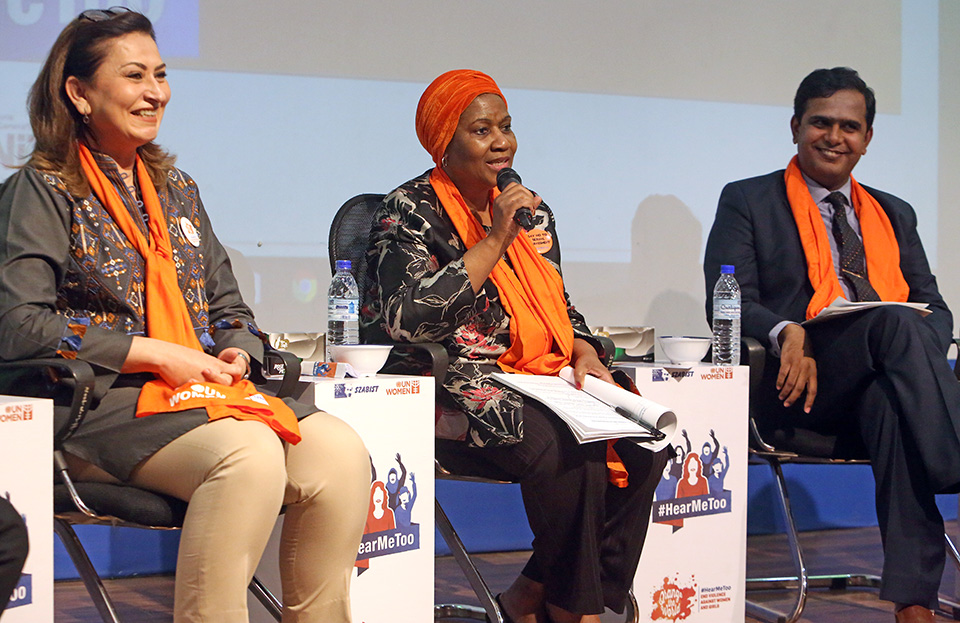
“One of the best practices of leaders is to show no tolerance, whether it is the administration of the university, of a company or of a political party, to sexual harassment. When leaders set the tone from the top, it really helps to generate a way of dealing with such issues,” she said.
In the wake of cases of sexual harassment on university campuses and realizing the need of academic institutions to be safe spaces for scholars, the Executive Director engaged with the faculty and students.
“The most important contribution of the #MeToo movement is to give voices to women, whose voices and pain have been invisible,” she added.
This year’s UN theme for the 16 Days of Activism is, Orange the World: #HearMeToo, to amplify the voices of survivors and activists.
“We need to join hands and exercise the power of solidarity to promote and coordinate efforts to advance the full realization of women’s rights, to tell them how valuable and precious they are; that they are to be treated with dignity and respect; that they should disregard anyone who demeans or devalues them,” said Ms. Nasreen Haque, Vice President of SZABIST Karachi Campus.